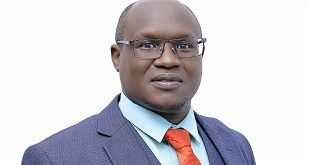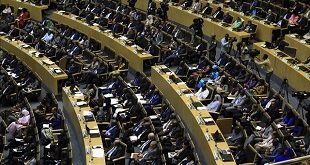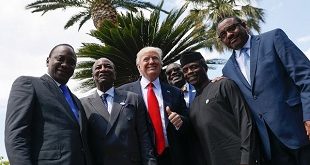
By Independent Investigations Team
A look at the relationship between Museveni and Amelia Kyambadde
The Sunday Vision newspaper of June 6 announced a ‘reshuffle’ in State House. The story said that a re-organisation had taken place at the president’s residence which also houses his private office. The re-organisation, the story said, affected several senior members of staff among them the President’s Private Principal Secretary (PPS), Amelia Kyambadde.

The Sunday Vision said that Kyambadde would be replaced by Grace Akello.
Sunday Vision is published by The New Vision Corporation which is owned and run by the government of Uganda. The story was confirmed by the Presidential Press Secretary, Tamale Mirundi. However, the next day, Mirundi issued a partial denial of his information. ‘Amelia Kyambadde remains PPS,’ he said. Mirundi’s untidy flip-flop over such an important announcement has left red-inked question marks on many minds.
Who engineered this announcement and why? Who ordered its immediate withdrawal and why? And more critically, last year, Kyambadde announced her intentions to seek election as Member of Parliament for Mawokota North. Why has she decided to leave State House where she has worked since 1986, first as the president’s secretary and later as his PPS? Why has the president allowed her to quit State House? Or has he?
Since she announced she was running for parliament, Kyambadde sparked off an internal power struggle inside State House and in the wider NRM structure for this highly coveted job. Factions emerged within the ruling party fronting candidates who would give them clout at State House. Sources say this struggle has turned ugly.
According to highly placed sources around the President, one such faction is led by Foreign Minister Sam Kutesa. Its candidate is Moses Byaruhanga, the president’s untiring Senior Private Secretary in Charge of Political Affairs. Byaruhanga has served at State House since 1994, is married to Mrs Museveni’s niece and also a niece to Kutesa’s late wife, Jennifer.
In the opposing line is a faction led by Security Minister Amama Mbabazi who is also the NRM Secretary General. This faction has been fronting New Vision’s CEO, Robert Kabushenga.

Top security sources tell The Independent that in a vetting report to the President, intelligence organisations recommended Kabushenga. It is believed he has better strategic understanding of the challenges of running the Office of the President than Byaruhanga.
Each faction continues to block the appointment of the choice of the other in the belief that the faction that backs the next PPS will gain extraordinary control over access to the president. This rivalry has degenerated into an ugly fight.
Insiders say that to cool these pressures and signal that if internal NRM warfare over the job does not cease, both sides will lose, the President decided to appoint a low key entity within the NRM power structure, Grace Akello, as deputy PPS.
But things may be moving fast and both sides may have lost. That is how Tamale Mirundi appeared to issue a retraction of Akello’s appointment. However, he confirmed to The Independent that Akello is to take over as the PPS when Amelia leaves office at the end of June.
According to Mirundi, Kintu Nyago, a longtime NRM spin-doctor will become Deputy PPS. People knowledgeable about State House affairs say the appointments put the President in a tactical dilemma.
Akello and Nyago lack the personal connection with the president that is necessary to sustain the influence that Kyambadde brought to that office.
In executing his job, especially when meeting foreign delegations, Museveni likes to switch from English to vernacular. Akello does not speak Runyankore, the president’s language. Equally the president does not speak her language, Iteso.
‘This is likely to impose a severe constraint on how the President handles foreign visitors,’ a State House source said. Both Kabushenga and Byaruhanga speak languages (Rukiga and Runyoro respectively) that are similar to Runyankore with the only difference being accent.
Until 2005, when Amelia was appointed to it, the office of the PPS was not as popular and influential as it is today. Its occupant, Mrs Joan Magezi, enjoyed the respect of the President and some trust, but not to the degree of Kyambadde. Magezi, although loyal to the President, was a career civil servant not rooted in Museveni’s guerrilla struggle.
It is said that during Magezi’s time, Kyambadde behaved like a secretary extraordinaire who handled the President’s correspondences. Although she was at a lower rank, she was in effect working as PPS.
As PPS she has controlled the duties of the secretary to the president, the PPS and to some extent, the role of the Minister for Presidency.

As a security measure, one has to go through her to reach Museveni. She can decide whether you can meet the President or not. Even some ministers cannot see Museveni unless she allows them. Those who know the President say Amelia helped him implement the theory of good cop (Museveni) bad cop (Amelia). Whenever individuals wishing to see the President were blocked, they tended to blame Amelia. This has created both fear and respect for and against the powerful Kyambadde.
Her strategy on the job, however, only partially explains why she has been close to the president for this long? What makes her the most powerful PPS in Uganda’s history? What is the nature of her relationship with President Museveni?
Amelia has told the story of how she first met Museveni in 1979. At the time, Museveni was the Minister of Defence in the second post-Idi Amin regime, the Uganda National Liberation Front (UNLF) government of former president Godfrey Lukongwa Binaisa.
She had been carjacked by soldiers and ran to minister Museveni to help her recover her car. Museveni complied and as a parting shot asked her what she was doing for a living. ‘I am a secretary,’ Amelia replied according to her own narrative. Museveni then asked her if she could get him a secretary.
‘After a long search, I failed to find a secretary,’ Amelia says, ‘So I offered myself’.
When Binaisa transferred Museveni to the insignificant portfolio of ‘minister for regional cooperation’, Kyambadde remained his ‘eyes and ears’ at the defence ministry.
In December 1980, Milton Obote was elected president and he appointed Paulo Muwanga vice president and minister of defence. According to sources close to the President, Muwanga hatched a plan to kill Museveni in 1981. Kyambadde, who had remained a secretary in the ministry and worked directly for Muwanga got wind of the plan.
According to sources, she telephoned Museveni and tipped him off on the plot. Museveni advanced his date of escaping to the bush to February 6, 1980. He later helped Kyambadde relocate to Sweden where she stayed in exile till 1986. Kyambadde won the confidence of Museveni.
‘There is nobody close to the president as Kyambadde is,’ a State House source who preferred anonymity told The Independent, ‘She knows all his secrets, official, unofficial and personal.’
This has given Kyambadde considerable political clout. For example, she has led the fight to get Central Broadcasting Service radio re-opened after Museveni shut it down on the recommendation of UPDF generals and security officers led by Gen. David Tinyefuza.

According to inside sources, Kyambadde established contact with Museveni’s nemesis, the Mengo establishment and organised for CBS fans and owners to meet the President and reach an agreement to re-open the radio station. The military generals who still want it closed but Kyambadde’s maneuvers show her clout.
Re-opening CBS is designed to aid Kyambadde’s campaigning for the Mawokota North constituency. However, the question many are asking is whether Museveni can really let Kyambadde go? Questions are also being asked about why she would be leaving such a powerful office for elective politics? Is she targeting not merely the job of MP of the people of Mawokota in Mpigi district but a juicy ministerial post or a bigger position?
‘Amelia controls everything here,’ a State House source told The Independent. ‘She has literary redefined the role of PPS because of the trust the president puts in her and also because of their closeness. She controls the biggest informal budget being closer to the president.’
Close State House observers say that Kyambadde’s primary motivation for seeking a parliamentary seat is born of her silent but intense rivalry with the First Lady, Janet Museveni.
‘Previously,’ a State House analyst said, ‘this rivalry was limited to infighting at State House ‘ both Janet and Amelia sought to influence the President from within. But Janet redefined the nature of this rivalry by seeking a parliamentary seat. When she went to parliament, she established an alternative power-base, got herself into cabinet and could now count on her wider political clout than merely being a First Lady.’
At parliament, Mrs Museveni sought to project herself as a liberal-minded person. She has consistently taken progressive positions on critical national issues. To the chagrin of her husband during the Temangalo saga, she took a strong position against the powerful Security Minister Mbabazi who was accused of corruption. In a meeting between the President and MPs from Ankole, she accused Roads Minister John Nasasira of corruption and incompetence.
To consolidate her position, Mrs Museveni sought to win the sympathy of those who feel alienated by the system and by Kyambadde. When Kyambadde pushed for the prosecution of Maj. Gen. Jim Muhwezi for GAVI and Global Fund scandals, Mrs Museveni sided with Muhwezi. She also sided with Brig. Henry Tumukunde during his one and a half-year military detention. She has also been helping some MPs secure appointments to meet the President. Recently, the President has appeared to listen to the First Lady and take her arguments and positions on issues more seriously than before.
According to observers, Kyambadde has noted this growth in Mrs Museveni’s power and influence. State House sources said she began countering this. For example, if the First Lady met with four or five MPs over an important issue, Kyambadde would also organise for the MPs to meet the President ‘ sometimes to hear from them what Mrs Museveni told them.

Soon, she also began taking progressive positions on issues. In fact, insiders say, she supported the forces opposed to Mbabazi during the Temangalo scandal. ‘She would express her views in informal settings,’ one source said, ‘She was guarded but she did reveal her side. When Mrs Museveni spoke out against Mbabazi at State House in October 2008, Amelia cheered.’
During the controversial by-election in Sembabule District, Kyambadde supported Joy Kabatsi while the President supported Anifa Kawooya. Some people have asked whether this increasing distance in positions between Museveni and Kyambadde is a ruse or real. If it is real, is it because Museveni is beginning to distance himself from her? Is this why she decided to quit? Insiders say it’s unlikely since her power and influence have grown, not shrunk.
‘She must have decided to run for parliament in order to get herself at par with Janet,’ a State House analyst told The Independent.
The other reason, observers say, is that she has done the same job all her life and would like a new status now. Some State House insiders say that although she is a very powerful player, the job also comes with high costs. She has sometimes to work for over 18 hours a day away from her family and children. Sometimes, when angry, the President barks at her openly causing her to break into tears.
But why would Museveni allow her leave State House especially given the valuable service to him? Before answering this question, it is important to underline Kyambadde’s role in the President’s scheme of things.
According to State House insiders, many people come to the President with various complaints, demands and requests for assistance often of a financial nature. Many times the president, for political reasons, is reluctant to disappoint them. Therefore, even when Museveni is not willing to financially assist someone, he still promises to and asks Kyambadde to execute his order. If she gave financial assistance to all those whom Museveni promises, State House would run out of money within a month. So how does it work?
According to those who know him well, Museveni is a man of extreme pride. He cannot tell his secretary openly that what he promised someone is a lie, even though he was actually lying to them. Kyambadde understands the President’s gestures. She can, using her intuition, know when the President is serious or unserious about his promises. Therefore, she is able to implement Museveni’s wishes without the President having to explicitly tell her what to do.
This intuition, combined with a long and established track record of loyalty and keeping the President’s confidence have given her a veritable position at State House. From this vantage point, and as years have passed, Kyambadde has consolidated her position in the President’s heart, calculations and strategies.

With this position, why would the president let such a valuable person leave State House for parliament? Some observers say that Kyambadde is actually not going anywhere. They say when (and not if) she is elected to parliament; she is likely to be made minister for the presidency. This way, the duties she was doing as PPS would now shift to the minister for the Presidency.
‘President Museveni does not work through formal institutions of the state,’ a close confidante of the President told The Independent in an interview, ‘He works through informal structures and networks. It does not matter what official position you hold. What matters is your personal relationship with him. If you enjoy his trust and confidence, regardless of your official position, you will be able to handle any assignment even at the highest level that he will not assign to the prime minister or the vice president.’
This analysis is largely true. Security minister Amama Mbabazi, the late former permanent secretary in the ministry of defence, Noble Mayombo, Jim Muhwezi (when still director general of Internal Security Organisation ‘ ISO) and Kahinda Otafiire (when still director general of External Security Organisation ‘ ESO) have enjoyed such trust and performed tasks above their job description.
It is possible therefore that the President allowed Kyambadde to run for parliament knowing that she can return to the presidency and serve him as she has always done.
For her part, controlling access to the president has given Kyambadde incredible political clout. Many who know her believe that she would never have sought to run for MP if she was not sure she would retain presence around the president and with it, clout and influence.
Kyambadde will now have an electoral mandate, see herself as equal in status to Mrs Museveni and also sit in cabinet. Yet she will retain her role of arranging the president’s schedule ‘ deciding whom he can meet and whom he should not.
Her entry into elective office has not been without incident. When The Observer newspaper on February 4 ran a story under the headline, ‘Kyambadde gets Museveni boost’, the President’s Deputy Press Secretary, Nabusayi Linda Wamboka, issued a statement implying that the President had not endorsed Kyambadde to run as candidate for Mawokota North.

‘It is only the people of that constituency who through the party primaries will choose who to represent them,’ Wamboka wrote. She explained that campaign posters bearing Kyambadde’s image and a campaign song titled ‘Amelia’ by Dr Hilderman, a local musician, did not indicate that she was campaigning.
Even the incumbent Mawokota North MP, Peter Mutuluuza, told The Independent that he had met the President and ‘he does not seem to support Amelia’s contesting for the seat’. Mutuluuza says Amelia appears to have her own ambitions and reasons to stand for that position. ‘I am ready to compete with her and my people will surely vote for me,’ he said.
According to Mutuluuza the Amelia camp is using government programmes to try to win support from the people and that she thinks without Mengo’s mouthpiece, CBS, on air she would face a serious problem campaigning among the Baganda who believe in the Mengo establishment. ‘She is being sent to commission and supervise government programmes as a ploy to kick me out but I will not give up for anybody,’ says Mutuluuza. He says the shift from one party system to multiparty system of governance has sparked competition within the NRM and ‘each party member wants to be seen working hard’. He says this is the case with Amelia Kyambadde.
 The Independent Uganda: You get the Truth we Pay the Price
The Independent Uganda: You get the Truth we Pay the Price


